Improved technology and environmental issues are impacting on the demand for battery electric forklifts around th...
Improved technology and environmental issues are impacting on the demand for battery electric forklifts around the world and Nichiyu has launched its new 70 series in Australia.
According to a recent British Government study the demand for battery powered forklifts are increasing with a world demand in 2005 of 260,000 units rising to 350,000 in 2010.
In Australia, records show that in 1996 electric forklifts represented 22% of market share compared to today’s figures which show a major increase to over 50%.
The reasons for this have been largely motivated by concerns about toxic emissions from internal combustion (I.C.) engines, as well as hygiene issues, noise and higher fuel and maintenance costs.
Technological advances have also increased the performance levels of battery electric machines which are now measuring up favourably in areas where IC trucks, in the past, were considered better.
Whilst the initial unit cost of battery electric machines have traditionally been higher than IC trucks: according to Nichiyu Australia, companies who analyse the longer term financial implications will see how they are able to recoup these costs and make substantial savings over the useful working life of their machines.
Whole of life analysis
Craig Coles, Nichiyu Australia’s National Sales Manager said,” We recommend to companies who are anticipating the purchase of new forklifts to firstly carry out a Whole of Life cost analysis before they make a decision .From our many case study examples we calculate that on average - if you only consider fuel savings - the payback period can, in many cases, be within two years”
“One bottle of LPG per day, at say $18.00 a bottle over five years, works out at $23,400 instead of battery recharging electricity costs of $1,274, for an 8 hour off peak cost for an electric truck. If you then consider IC trucks have so many more moving parts which are subject to wear and tear, this can mean an additional saving of up to 40% more on maintenance costs, “He added.
New AC 70 series launch
Nichiyu has launched its new AC battery electric forklift range in October last year.
Nichiyu’s new range is built around three core units namely the 70 series sit -on reach truck; the 70 series three wheeler and the70 series four wheeler container truck. All incorporate the
SICOS – AC central control system that integrates the travel, hydraulic and the electric power steering system which is tuned to be fully compatibility with AC systems.
Managing Director, Atsushi Tomita said, “We are extremely fortunate with the new 70 series because our design engineers have provided a more advanced, powerful, and more intelligent operating system which optimizes the operator’s interaction with the forklift. What this means is our customers will be getting a choice of machines which provide higher operational performance levels that are easier to operate, as well as being safer and more eco-friendly”
Nichiyu’s new sit on reach truck design features a number of up to date improvements.
Examples of this are a 360º continuous steering capability and an ability to lift up to 10 metres high without any lift weight depreciation to a height of 7 metres. In addition to this they are faster and more compact, enabling them to manoeuver in smaller aisle spaces. Driver comfort, visibility and safety have been improved by the central hydraulic lift ram being positioned off centre, providing a viewing gap which enables the driver to look directly ahead.
The three wheeled model is designed for tight turns in narrow aisles making them particularly suitable in warehouse areas where conventional counter balanced forklifts are unable to access due to limited space or where tight turns are required. With its synchronised tyre rotation system, the 70T 15, for example, has a small turning radius and provides a significant improvement in stability.
All machines have energy efficient regenerative power capabilities and power steering on demand to ensure energy is not wasted and operating times between recharging shifts is optimised.
ISO Container Compatible
With the advances in battery electric forklift technology and performance, Nichiyu anticipates a lot of interest in the new four wheeled machines which are designed to operate competitively with IC trucks in the area of ISO shipping container loading and unloading. This 70 series four wheeled range is available in 2, 2.5 and 3 tonne capacity models.
As these machines are compact - measuring only 2050 mm high - they are able to easily be driven into Reefer Containers and the ability to ascend gradients of 19%. For wet weather operations it is compliant with the IPX3 rainproof enclosure rating, which means, rain falling vertically or at a 60º angle, will not hinder the machines operational ability. For additional safety a rear axle safety lock is incorporated to give extra stability when turning into sharp corners.
Coles says,” Traditionally, many companies had to transfer to an electric truck from an IC unit so they could drive inside a warehouse premises to avoid toxic emissions. With increased power, speed and gradability, companies now need only use a single Nichiyu four wheeled AC machine for inside use as well as for outside shipping container operations.”





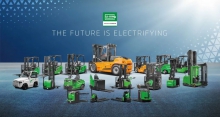
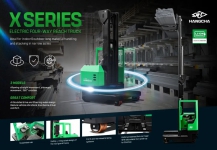
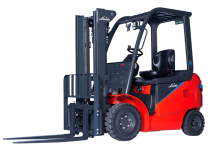
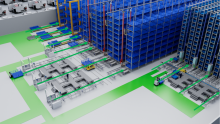
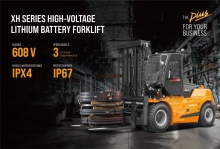

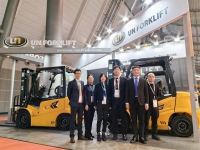
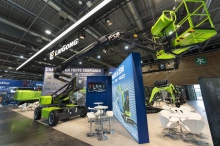
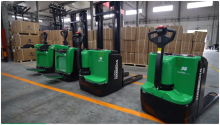
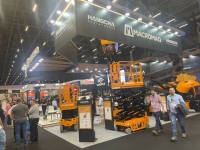


 粤公网安备 44010602003952号
粤公网安备 44010602003952号